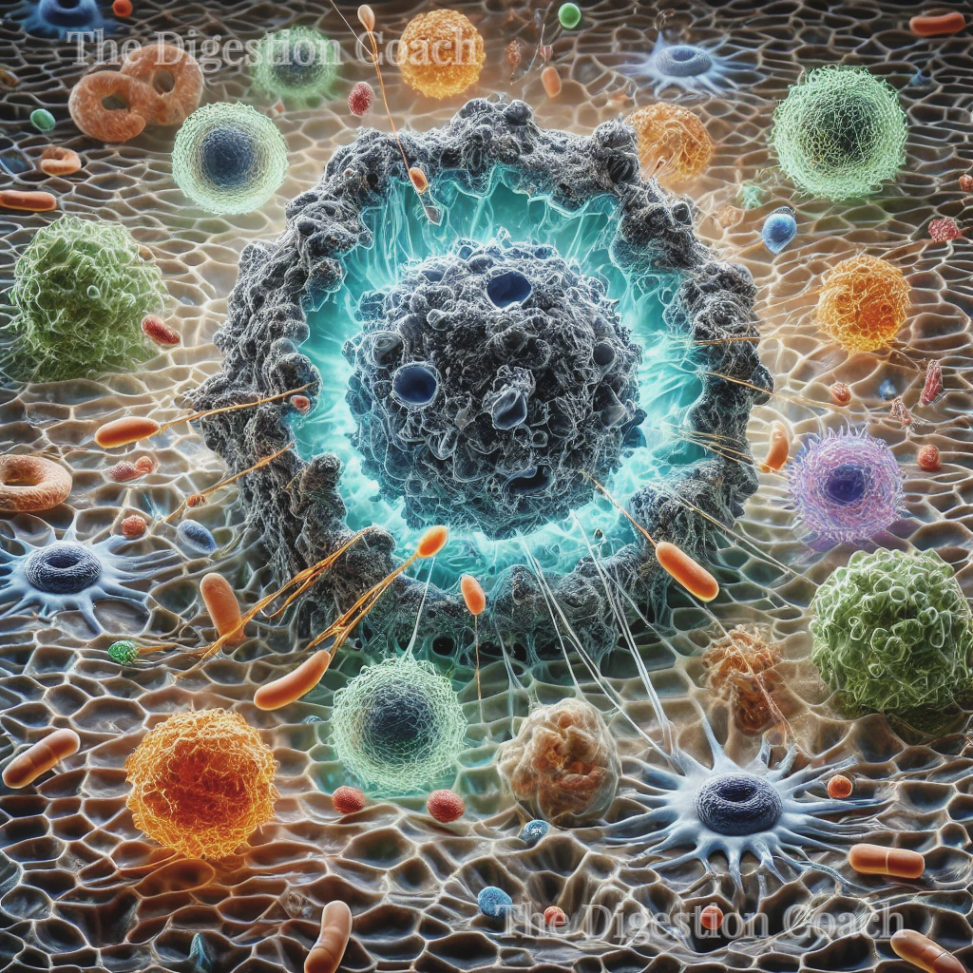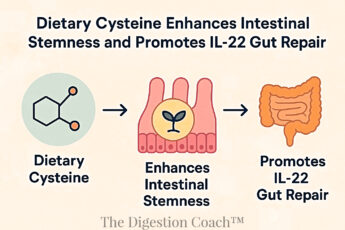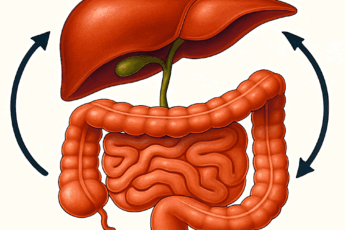The Role of Specific Gut Bacteria in Health, Antitumor Immunity, and Postbiotic Metabolism
Table of Contents
- Key Dietary Compounds Metabolized
- Here’s a Comprehensive List of Foods that Support the Key Dietary Compounds Listed Above
- Postbiotic Compounds Produced and Their Effects
- Genera and Key Functions
- Gut Bacteria–Mediated Antitumor Immunity
- Conclusion
The human gut is home to trillions of microorganisms that play critical roles in maintaining health and regulating immune function. Among these, specific bacterial strains stand out for their ability to metabolize dietary compounds, produce beneficial metabolites (postbiotics), and support the body’s antitumor immunity. As a self-trained microbiologist and gut health coach, I put this article together to share the key characteristics of 14 bacterial strains—Bifidobacterium breve, Bifidobacterium longum, Akkermansia muciniphila, Alistipes indistinctus, Enterococcus hirae, Enterococcus faecium, Enterococcus durans, Enterococcus mundtii, Coprobacillus cateniformis, Erysipelatoclostridium ramosum, Lactobacillus gallinarium, Lactobacillus rhamnosus GG, Roseburia intestinalis, and Faecalibacterium prausnitzii—exploring their food substrates, postbiotic production, and their vital role in gut bacteria–mediated antitumor immunity.
Key Dietary Compounds Metabolized
These bacterial strains metabolize a variety of dietary compounds, contributing to gut homeostasis and the production of metabolites with health-promoting properties:
- Prebiotic Fibers and Non-Digestible Carbohydrates
- Inulin, fructooligosaccharides (FOS), and galactooligosaccharides (GOS) are fermentable fibers that support the growth of Bifidobacterium and Roseburia species.
- Resistant starch and pectins fuel Faecalibacterium prausnitzii and other butyrate producers, enhancing gut health and preventing inflammation.
- Polyphenols
- Plant-based compounds found in foods like berries, wine, tea, and chocolate are metabolized into bioactive metabolites by Faecalibacterium, Roseburia, and Akkermansia muciniphila. These metabolites exhibit anti-inflammatory and antioxidant properties that support systemic health.
- Mucin and Host-Derived Sugars
- Akkermansia muciniphila specializes in degrading mucin, strengthening the gut barrier, and promoting immune homeostasis.
- Alistipes indistinctus and Enterococcus species also metabolize host-derived sugars, contributing to gut health and providing energy for epithelial cells.
- Amino Acids and Proteins
- Enterococcus species and Erysipelatoclostridium ramosum are involved in protein fermentation, producing short-chain fatty acids (SCFAs) and other health-associated metabolites.
Here’s a Comprehensive List of Foods that Support the Key Dietary Compounds Listed Above
1. Prebiotic Fibers and Non-Digestible Carbohydrates
These foods help feed beneficial bacteria like Bifidobacterium and Roseburia, promoting the production of short-chain fatty acids (SCFAs) and maintaining gut health.
Inulin-Rich Foods (Natural Sources of Prebiotic Fiber)
- Chicory root
- Jerusalem artichokes
- Dandelion greens
- Asparagus
- Garlic
- Onion
- Leeks
- Bananas (especially slightly green)
Fructooligosaccharides (FOS) and Galactooligosaccharides (GOS)
- Legumes (lentils, chickpeas, kidney beans, black beans, black gram [Vigna mungo])
- Whole grains (barley, rye, oats)
- Dairy products with added GOS (such as yogurt and kefir)
- Green peas
- Soybeans
Resistant Starch Sources
- Cooked and cooled potatoes
- Cooked and cooled rice
- Green bananas and plantains
- Oats (especially steel-cut or rolled oats)
- Legumes (lentils, beans)
- Whole grains (quinoa, barley)
Pectin-Rich Foods
- Apples (especially with the skin)
- Citrus fruits (orange, grapefruit, lemon – the white pith is rich in pectin)
- Carrots
- Pears
- Strawberries
- Tomatoes
2. Polyphenol-Rich Foods
These foods are metabolized by Faecalibacterium, Roseburia, and Akkermansia muciniphila into bioactive compounds with anti-inflammatory and antioxidant effects.
Berries and Fruits
- Blueberries
- Raspberries
- Blackberries
- Strawberries
- Pomegranate
- Grapes and red wine
- Cherries
- Apples
Vegetables
- Red onions
- Broccoli
- Spinach
- Kale
- Artichokes
Herbs, Spices, and Other Sources
- Green tea and matcha
- Black tea
- Dark chocolate (70% or higher cacao content)
- Turmeric
- Cloves, cinnamon, and oregano
- Olive oil (extra virgin)
3. Mucin and Host-Derived Sugars
These foods help support Akkermansia muciniphila and Alistipes indistinctus, which are crucial in maintaining the gut barrier and promoting immune homeostasis.
Mucin-Stimulating and Gut-Barrier-Supporting Foods
- Polyphenol-rich foods (as listed above)
- Omega-3-rich foods (salmon, sardines, flaxseeds, walnuts)
- Fermented foods (kefir, yogurt, sauerkraut, kimchi, miso)
- Bone broth (supports gut lining integrity)
- Cranberries (known to support gut barrier function)
4. Amino Acids and Protein-Rich Foods
These foods promote the growth of Enterococcus species and Erysipelatoclostridium ramosum, which ferment proteins and contribute to SCFA production and gut health.
High-Quality Protein Sources
- Wild-caught fish (salmon, mackerel, sardines)
- Organic, Pasture-raised eggs
- Organic chicken and turkey
- Grass-fed beef
- Legumes (lentils, chickpeas, beans)
- Fermented soy (tempeh, miso, natto)
Amino Acid-Rich Plant-Based Foods
- Quinoa
- Hemp seeds
- Pumpkin seeds
- Almonds
- Chia seeds
5. Fermented Foods (Natural Probiotic Sources)
While not direct prebiotic compounds, these foods help maintain a healthy microbial balance and support the growth of beneficial bacteria.
- Yogurt (with live cultures)
- Kefir
- Sauerkraut
- Kimchi
- Miso
- Tempeh
- Fermented pickles (without vinegar)
Postbiotic Compounds Produced and Their Effects
Postbiotics—bioactive compounds produced by gut bacteria—are critical in health and disease prevention. The key postbiotic compounds generated by the listed bacterial strains include:
- Short-Chain Fatty Acids (SCFAs)
- Butyrate: Produced by Faecalibacterium prausnitzii and Roseburia intestinalis, butyrate is crucial for colon health, anti-inflammatory effects, and promoting gut barrier integrity. It also induces apoptosis in tumor cells, contributing to cancer prevention.
- Acetate and Propionate: Produced by Bifidobacterium and Akkermansia, these SCFAs regulate immune responses and enhance gut barrier function.
- Polyamines (Spermidine and Spermine)
- Polyamines, produced by Enterococcus species, are essential for cell growth and maintaining gut barrier function. They also enhance autophagy, a process linked to cancer prevention.
- Indole and Tryptophan Derivatives
- Produced by Alistipes indistinctus and Enterococcus species, these metabolites regulate the aryl hydrocarbon receptor (AhR) pathway, which supports gut homeostasis and suppresses tumor formation.
- Mucus-Strengthening Compounds
- Akkermansia muciniphila enhances mucus production, improving gut barrier integrity and reducing inflammation-associated cancer risk.
- Antimicrobial Peptides and Bacteriocins
- Enterococcus species and Lactobacillus rhamnosus GG produce antimicrobial peptides that inhibit pathogenic bacteria, maintaining a healthy microbial balance in the gut.
Genera and Key Functions
These bacterial strains belong to genera known for their health-promoting and immunomodulatory properties:
- Bifidobacterium – Key for early-life gut colonization, fiber fermentation, and immune modulation.
- Akkermansia – A next-generation probiotic with anti-inflammatory and gut-barrier-strengthening effects.
- Roseburia and Faecalibacterium – SCFA producers, especially butyrate, are known for reducing inflammation and preventing colorectal cancer.
- Enterococcus – Found in fermented foods, these bacteria produce antimicrobial compounds and modulate the immune system.
- Lactobacillus – Common probiotics that support gut health and reduce inflammation.
- Erysipelatoclostridium – Metabolizes fiber and protein, contributing to gut health and SCFA production.
Gut Bacteria–Mediated Antitumor Immunity
Several bacterial strains discussed have been shown to support gut bacteria–mediated antitumor immunity. They enhance immune function, improve the efficacy of cancer therapies, and reduce chronic inflammation, a major driver of cancer development.
1. Immune System Modulation
- Bifidobacterium breve and Bifidobacterium longum boost T-cell activation and improve responses to immune checkpoint inhibitors (anti-PD-1/PD-L1 therapies).
- Akkermansia muciniphila enhances CD8+ T-cell infiltration into tumors, increasing the effectiveness of immunotherapy.
- Enterococcus hirae induces tumor-specific CD8+ T-cell activation and enhances the efficacy of cyclophosphamide-based chemotherapy.
2. Metabolite-Driven Antitumor Effects
- Butyrate (from Faecalibacterium prausnitzii and Roseburia) induces apoptosis in tumor cells and suppresses tumor-promoting inflammation.
- Polyamines and tryptophan metabolites help modulate immune responses and reduce tumor progression.
3. Gut Barrier Integrity and Cancer Prevention
A healthy gut barrier is crucial for preventing systemic inflammation and cancer. Akkermansia muciniphila and butyrate producers like Roseburia and Faecalibacterium play a key role in maintaining epithelial integrity and reducing cancer risk.
4. Anti-Inflammatory Effects
Chronic gut inflammation is a significant risk factor for cancer. Many of these strains—Lactobacillus rhamnosus GG, Bifidobacterium breve, and Enterococcus species—reduce levels of proinflammatory cytokines like IL-6 and TNF-α, thereby mitigating cancer risk.
Conclusion
As a doctor and GI health enthusiast, the bacterial strains described—Bifidobacterium breve, Akkermansia muciniphila, Faecalibacterium prausnitzii, and others—are some of my favorite microbiome bacteria and critical players in gut health. They metabolize dietary compounds into beneficial postbiotics that modulate the immune system and support antitumor immunity. Their ability to enhance the efficacy of cancer therapies and maintain a healthy gut environment highlights their therapeutic potential in preventive and integrative oncology. Continued research into these strains could unlock novel cancer prevention and treatment interventions, solidifying the gut’s role as a critical component of systemic health and immunity.
COMPLEMENTARY 15-MINUTE CALL
Take your first step toward a renewed sense of well-being. Call today to arrange a complimentary 15-minute consultation.
Let’s discern whether my approach aligns with your needs.
I look forward to connecting with you at 714-639-4360.
Polyamines and SCFAs + B Vitamins: The Gut-Neurological Link










